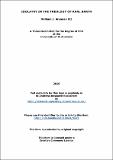Files in this item
Idolatry in the theology of Karl Barth
Item metadata
| dc.contributor.advisor | Webster, J. B. (John Bainbridge) | |
| dc.contributor.author | Brennan, William III | |
| dc.coverage.spatial | xi, 264 p. | en_US |
| dc.date.accessioned | 2016-06-22T08:41:26Z | |
| dc.date.available | 2016-06-22T08:41:26Z | |
| dc.date.issued | 2016-11-30 | |
| dc.identifier | uk.bl.ethos.690332 | |
| dc.identifier.uri | https://hdl.handle.net/10023/9029 | |
| dc.description.abstract | This dissertation analyses and critically evaluates an aspect of Karl Barth’s thought, the understanding of which is important to a broader understanding of Barth, his relationship to other (especially iconoclastic) thinkers, and his relevance for contemporary theology: his understanding and critique of idolatry and the idol. Chapter 2 argues that it was revelation which both drove Barth’s idolatry-critique and determined his concepts of idolatry and the idol. It analyses Barth’s idolatry-critique as it was levelled against natural theology, and offers an evaluation of the picture of Barth’s thought which emerges. Chapter 3 analyses Barth’s idolatry-critique in relation to the doctrine of God. Directives which, for Barth, had to be adhered to within the development of the doctrine of God for the avoidance of idolatry, are discussed. Finally, an evaluation and critique of Barth’s critique of idolatry within the doctrine of God, and of his own adherence to these directives, is offered. Chapter 4 analyses the relationship of Barth’s idolatry-critique to his discussion of religion. It is shown that Barth, in his mature thought, criticised both the essence of religion and certain theological uses of the concept of religion as idolatry. Barth’s critique of religion as idolatry is itself subjected to critique, and the question of what bearing his critique of religion as idolatry ought to have for Christian, theological engagement with adherents of other world religions is taken up. Chapter 5 summarises and discusses further some of the findings and implications of this study. It is suggested that Barth’s thoroughly christological critique of idolatry (which is not without its own problems), in that it stands in contrast to the less particularistic forms of idolatry-critique set forth by several other modern scholars, raises the question of whether an idolatry-critique like his own might be called for within contemporary theology. | en_US |
| dc.language.iso | en | en_US |
| dc.publisher | University of St Andrews | |
| dc.rights | Attribution-NonCommercial-NoDerivatives 4.0 International | * |
| dc.rights.uri | http://creativecommons.org/licenses/by-nc-nd/4.0/ | * |
| dc.subject | Idolatry | en_US |
| dc.subject | Karl Barth | en_US |
| dc.subject | Barth | en_US |
| dc.subject | Sanctification | en_US |
| dc.subject | Soteriology | en_US |
| dc.subject | Postmodernity | en_US |
| dc.subject | Metaphysics | en_US |
| dc.subject | Religion | en_US |
| dc.subject | Revelation | en_US |
| dc.subject | Idol | en_US |
| dc.subject | Idolatry-critique | en_US |
| dc.subject | Idol-critique | en_US |
| dc.subject | Incorporeality | en_US |
| dc.subject.lcc | BX4827.B3B84 | |
| dc.subject.lcsh | Barth, Karl, 1886-1968--Theology | en_US |
| dc.subject.lcsh | Idolatry | en_US |
| dc.subject.lcsh | Natural theology | en_US |
| dc.subject.lcsh | God (Christianity) | en_US |
| dc.title | Idolatry in the theology of Karl Barth | en_US |
| dc.type | Thesis | en_US |
| dc.type.qualificationlevel | Doctoral | en_US |
| dc.type.qualificationname | PhD Doctor of Philosophy | en_US |
| dc.publisher.institution | The University of St Andrews | en_US |
The following licence files are associated with this item:
This item appears in the following Collection(s)
Except where otherwise noted within the work, this item's licence for re-use is described as Attribution-NonCommercial-NoDerivatives 4.0 International
Items in the St Andrews Research Repository are protected by copyright, with all rights reserved, unless otherwise indicated.


